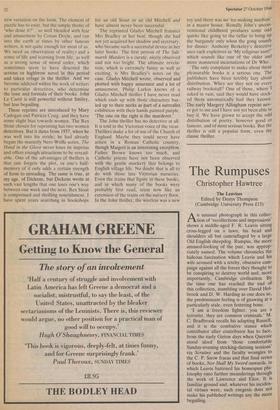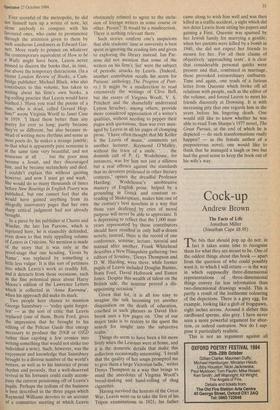The Rumpuses
Christopher Hawtree
The Leavises
An unusual photograph in this collec- tion of 'recollections and impressions' shows a middle-aged F. R. Leavis sitting cross-legged on a lawn, his head and shoulders all but camouflaged by a large Old English sheepdog. Rumpus, the more amused-looking of the pair, was approp- riately named. The volume chronicles the hideous fascination which Leavis and his wife aroused with a tetchy, obsessive cam- paign against all the forces they thought to be conspiring to destroy world and, more importantly, Cambridge civilisation. By the time one has reached the end of this collection, stumbling over David Hol- brook and D. W. Harding as one does so, the predominant feeling is of gnawing at a particularly stale, even festering bone.
'I am a freedom fighter, you are a terrorist, they are common criminals.' M. C. Bradbrook recalls his adapting Russell, and it is the combative stance which contributor after contributor has to face, from the early Girton days when Queenie stood aloof from 'those comfortable Sunday-evening stocking-darning sessions' via Scrutiny and the faculty wrangles to the C. P. Snow fracas and that final series of books, Nor Shall My Sword onwards, in which Leavis battened his homespun phi- losophy onto further meanderings through the work of Lawrence and Eliot. It is familiar ground and, whatever his inciden- tal virtues were, such exegesis does not make his published writings any the more beguiling. Ever scornful of the metropolis, he did not himself turn up a writer of note, let alone anybody to compare with his favoured ones, who came to prominence through the attention given to them by such assiduous Londoners as Edward Gar- nett. More ready to pounce on whatever the contemporary equivalent of How to be a Wally might have been, Leavis never paused to discern the books that, in time, rise above the temporary distractions. (In a recent London Review of Books, a Cam- bridge publisher, Michael Black, who also contributes to this volume, has taken to writing about his firm's own books, a log-rolling practice that Leavis would have loathed.) 'Have you read the poems of a man, who is dead, called Gerard Hop- kins?' wrote Virginia Woolf to Janet Case In 1919. 'I liked them better than any Poetry for ever so long; partly because they're so different, but also because in- stead of writing mere rhythms and sense as most poets do, he makes a strange jumble; so that what is apparently pure nonsense is at the same time very beautiful, and not nonsense at all . . . but the poor man became a Jesuit, and they discouraged him, and he became melancholy and died. I couldn't explain this without quoting however, and now I must go and wash.' She would do so many thousands of times before New Bearings in English Poetry was published, but one cannot feel that she would have gained anything from its allegedly innovatory pages that her own sharp critical judgment had not already brought.
In a piece by his publisher at Chatto and Windus, the late Ian Parsons, which is reprinted here, he is staunchly defended, even down to that truly appalling volume of Letters in Criticism. No mention is made of the story that it was only at the proof-stage that one heading, 'Gross by Name', was replaced by something a little less vulgar. It is this sort of pettiness Into which Leavis's work so readily fell, and it detracts from those occasions, such as the fine polemical piece about Harry Moore's edition of the Lawrence Letters which is collected in 'Anna Karenina' , .When his approach did make its mark.
Two people here chance to mention George Saintsbury — 'today quite forgot- ten' — as the sort of critic that Leavis replaced (one of them, Boris Ford, gives the impression that he brought to his editing of the Pelican Guide that energy necessary to produce the DNB or OED rather than cajoling a few cronies into Writing something that would not strike too Individual a note). Such, however, was the enjoyment and knowledge that Saintsbury brought to a diverse number of the world's writers, as well as to his histories of prose rhythm and prosody, that a well-deserved revival in his fortunes could easily accom- pany the current pensioning off of Leavis's Pupils. Perhaps the tedium of the business Is best described in the three pages which Raymond Williams devotes to an account of a committee meeting at which Leavis
obstinately refused to agree to the inclu- sion of foreign writers in some course or other. Proust? 'It would be a misdirection. There is nothing relevant there.'
Such stories confirm one's suspicions that able students' time at university is best spent in ignoring the reading lists and given to exploring the library instead. Ian Par- sons did not mention that some of the writers on his firm's 'list' were the subject of periodic attacks by Leavis. (Indeed, another contributor recalls his scorn for
Parsons' anthology The Progress of Poet- ry.) It might be a misdirection to read extensively the writings of Clive Bell, but the essays of Yirginia Woolf, V. S.
Pritchett and the shamefully underrated Lytton Strachey, among others, provide rbore considered appreciation of a writer's qualities, without needing to pepper their pages with quotations, than was ever man- aged by Leavis in all his pages of clomping prose. 'I have often thought that Mr Keller is the Leavis of music,' comments yet another lecturer, Raymond O'Malley, without the trace of a smile. . the donnish cult of P. G. Wodehouse, for instances, was for him not just a silliness but a real offence against the standards that its devotees professed in other literary contexts,' opines the dreadful Professor Harding; Wodehouse's unobtrusive mastery of English prose, helped by a grounding in Greek and constant re- reading of Shakespeare, makes him one of the century's best novelists in a way that those ears deafened by cries of moral purpose will never be able to appreciate. It is depressing to reflect that the 1,000 man- years represented by these contributors should have resulted in only half-a-dozen novels; instead, there is the record of one conference, seminar, lecture, tutorial and manual after another. Frank Whitehead describes a New Hampshire gathering: two
editors of Scrutiny, 'Denys Thompson and
D. W. Harding, were there, while former pupils of Leavis included Douglas Barnes, Boris Ford, David Holbrook and Esmor Jones. Despite this wealth of talent on the British side, the seminar proved a dis- appointing occasion.'
Given that lot, it is all too easy to imagine the talk becoming yet another disquisition on the death of education, couched in such phrases as David Hol- brook uses a few pages on. 'One of our major tasks is to restore to the quest the search for insight into the subjective realm.'
Things do seem to have been a bit more lively when the Leavises were at home, and it is the domestic details that make this collection occasionally interesting. 'I recall that the quality of her soups prompted me to give them a large Victorian ladle,' writes Denys Thompson in a way that brings to mind the anecdotes of Virginia Woolf s bread-making and hand-rolling of shag cigarettes. Having survived the horrors of the Great War, Leavis went on to take the first of his Tripos examinations in 1921; his father
came along to wish him well and was then killed in a traffic accident, a sight which did not deter Leavis from sitting his papers and gaining a First. Queenie was spurned by her Jewish family for marrying a gentile; when her parents were killed by a bomb in 1940, she did not expect her friends to mourn for her. For all their claims of objectively 'approaching texts', it is clear that considerable personal quirks were present and that, combined in marriage, these provoked extraordinary outbursts. Time and again, one reads of a furious letter from Queenie which broke off all relations with people, such as the editor of the volume, and forced Leavis to meet his friends discreetly at Downing. It is with increasing pity that one regards him in the years before his lingering death. One would still like to know whether he was able to read Tom Sharpe's 1977 novel, The Great Pursuit, at the end of which he is depicted — do such transformations really happen? — as the female author of a preposterous novel; one would like to think that he managed a laugh or two but had the good sense to keep the book out of his wife's way.



















































 Previous page
Previous page